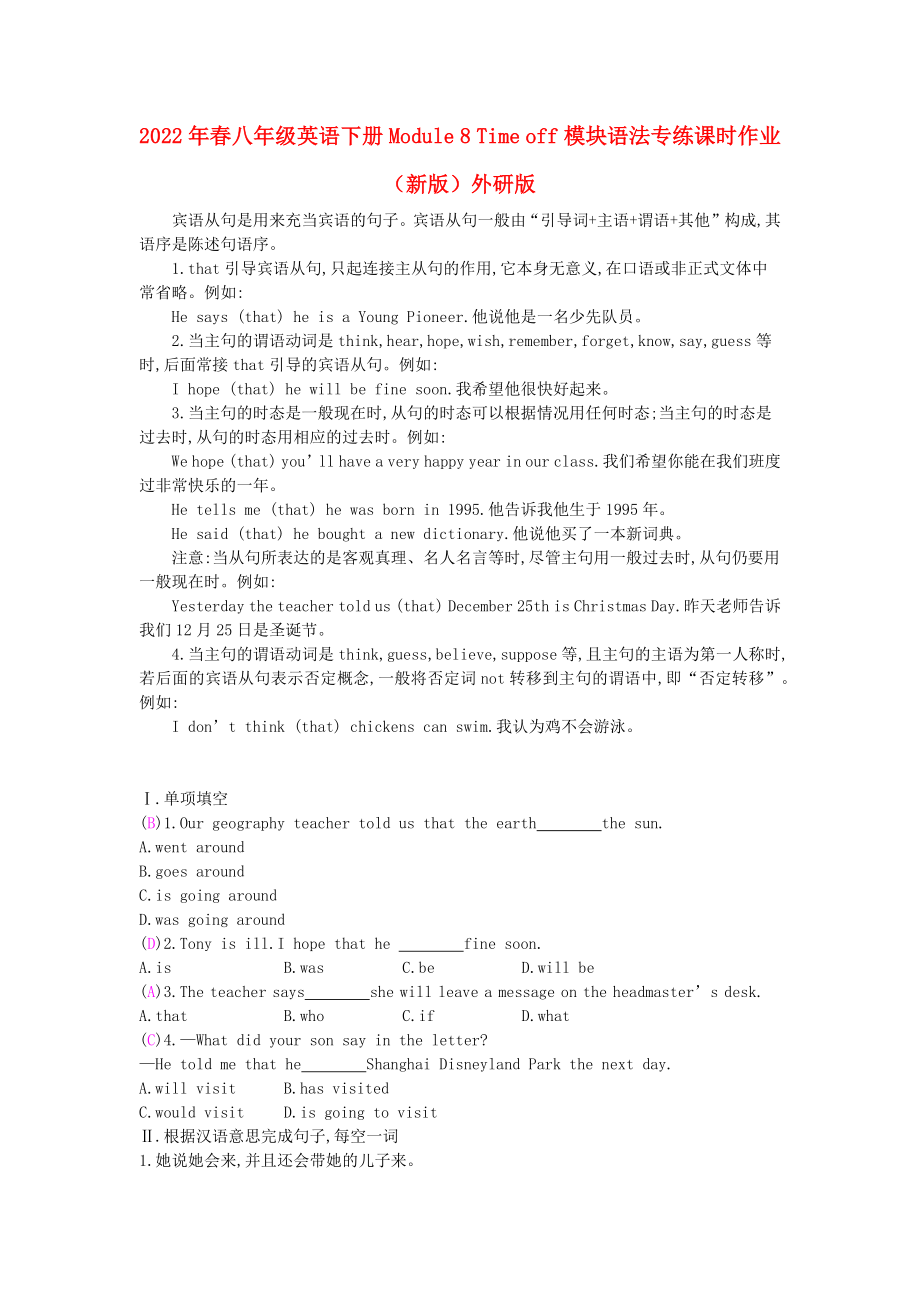《2022年春八年級(jí)英語(yǔ)下冊(cè) Module 8 Time off模塊語(yǔ)法專(zhuān)練課時(shí)作業(yè) (新版)外研版》由會(huì)員分享�����,可在線閱讀,更多相關(guān)《2022年春八年級(jí)英語(yǔ)下冊(cè) Module 8 Time off模塊語(yǔ)法專(zhuān)練課時(shí)作業(yè) (新版)外研版(2頁(yè)珍藏版)》請(qǐng)?jiān)谘b配圖網(wǎng)上搜索�����。
1�、2022年春八年級(jí)英語(yǔ)下冊(cè) Module 8 Time off模塊語(yǔ)法專(zhuān)練課時(shí)作業(yè) (新版)外研版
賓語(yǔ)從句是用來(lái)充當(dāng)賓語(yǔ)的句子�。賓語(yǔ)從句一般由“引導(dǎo)詞+主語(yǔ)+謂語(yǔ)+其他”構(gòu)成,其語(yǔ)序是陳述句語(yǔ)序。
1.that引導(dǎo)賓語(yǔ)從句,只起連接主從句的作用,它本身無(wú)意義,在口語(yǔ)或非正式文體中常省略�����。例如:
He says (that) he is a Young Pioneer.他說(shuō)他是一名少先隊(duì)員����。
2.當(dāng)主句的謂語(yǔ)動(dòng)詞是think,hear,hope,wish,remember,forget,know,say,guess等時(shí),后面常接that引導(dǎo)的賓語(yǔ)從句。例如:
I hope (that
2���、) he will be fine soon.我希望他很快好起來(lái)���。
3.當(dāng)主句的時(shí)態(tài)是一般現(xiàn)在時(shí),從句的時(shí)態(tài)可以根據(jù)情況用任何時(shí)態(tài);當(dāng)主句的時(shí)態(tài)是過(guò)去時(shí),從句的時(shí)態(tài)用相應(yīng)的過(guò)去時(shí)。例如:
We hope (that) you’ll have a very happy year in our class.我們希望你能在我們班度過(guò)非?����?鞓?lè)的一年。
He tells me (that) he was born in 1995.他告訴我他生于1995年��。
He said (that) he bought a new dictionary.他說(shuō)他買(mǎi)了一本新詞典�����。
注意:當(dāng)從句所表達(dá)的是客觀真理
3�����、��、名人名言等時(shí),盡管主句用一般過(guò)去時(shí),從句仍要用一般現(xiàn)在時(shí)���。例如:
Yesterday the teacher told us (that) December 25th is Christmas Day.昨天老師告訴我們12月25日是圣誕節(jié)���。
4.當(dāng)主句的謂語(yǔ)動(dòng)詞是think,guess,believe,suppose等,且主句的主語(yǔ)為第一人稱(chēng)時(shí),若后面的賓語(yǔ)從句表示否定概念,一般將否定詞not轉(zhuǎn)移到主句的謂語(yǔ)中,即“否定轉(zhuǎn)移”。例如:
I don’t think (that) chickens can swim.我認(rèn)為雞不會(huì)游泳���。
Ⅰ.單項(xiàng)填空
(B)1.Our geogr
4�、aphy teacher told us that the earth the sun.?
A.went around
B.goes around
C.is going around
D.was going around
(D)2.Tony is ill.I hope that he fine soon.?
A.is B.was C.be D.will be
(A)3.The teacher says she will leave a message on the headmaster’s desk.?
A.that B.who C.if D.what
5���、
(C)4.—What did your son say in the letter?
—He told me that he Shanghai Disneyland Park the next day.?
A.will visit B.has visited
C.would visit D.is going to visit
Ⅱ.根據(jù)漢語(yǔ)意思完成句子,每空一詞
1.她說(shuō)她會(huì)來(lái),并且還會(huì)帶她的兒子來(lái)�。
She said she would e and that she would also bring her son.?
2.報(bào)紙上寫(xiě)著,英語(yǔ)正變得越來(lái)越重要。
It s
6��、ays here,in the newspaper,that English is getting more and more important.?
3.我猜明天應(yīng)該是晴天���。
I guess it will be sunny tomorrow.?
4.恐怕他不能來(lái)這里了��。
I’m afraid that he can’t e here.?
5.他說(shuō)他們已經(jīng)回來(lái)了��。
He says they have returned already.?
Ⅲ.按要求完成句子,每空一詞
1.We hope we will arrive in Beijing on time tomo
7、rrow.(改為同義句)
We hope to arrive in Beijing on time tomorrow.?
2.I think he can do it better.(改為否定句)
I don’t think he can do it better.?
3.Tonysaid,“I will see a film with my parents tomorrow.”(改為含有賓語(yǔ)從句的復(fù)合句)
Tony said that he would see a film with his parents tomorrow.?
4.Good habits are very helpful.Emily says.(改為含有賓語(yǔ)從句的復(fù)合句)
Emily says that good habits are very helpful .?
5.These flowers are from Guangdong.He said.(改為含有賓語(yǔ)從句的復(fù)合句)
He said that these flowers were from Guangdong.
 2022年春八年級(jí)英語(yǔ)下冊(cè) Module 8 Time off模塊語(yǔ)法專(zhuān)練課時(shí)作業(yè) (新版)外研版
2022年春八年級(jí)英語(yǔ)下冊(cè) Module 8 Time off模塊語(yǔ)法專(zhuān)練課時(shí)作業(yè) (新版)外研版

